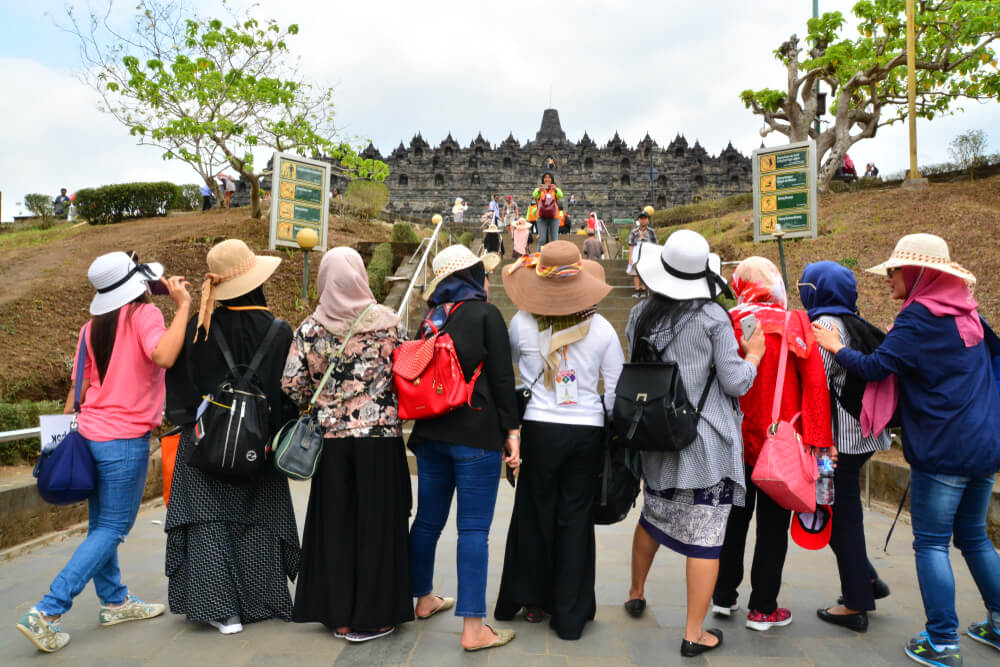Indonesia reformulating halal tourism strategy after missing 2018 targets
JAKARTA - Indonesia missed its halal tourism targets last year and needs to reformulate its strategy to boost the sector, Riyanto Sofyan, Chairman of Indonesia’s Team for Accelerated Development of Halal Tourism told Salaam Gateway.
“So far we have been relying too much on roadmaps that are created based on secondary research that only see potential data, and use estimates,” said Sofyan.
“If we can look at primary research and data taken directly from consumers, industry players will be sure about how big the market actually is,” he added.
Indonesia's Muslim-friendly travel sector missed its 2018 targets in areas including share of foreign exchange contribution to GDP, number of halal-certified hotels, and increase in dedicated industry workforce.
The sector was around 4-5 percent short of its 25 percent target of total tourism foreign exchange contribution to GDP, bringing in only around $5 billion last year. The 730 halal-certified hotels was 270 off-target, and the industry’s dedicated workforce of 536,693 was far below the aim of 805,039, which would have represented 20.14 percent of the total tourism labour pool. Additionally, the more than 800,000 mosques cross the country are in dire need of proper ablution facilities for women.
Overall, the number of Muslim visitors to Indonesia reached around 3.2 million in 2018, 300,000 short of the target. Muslim visitor numbers grew around 18 percent last year, down from 22.8 percent in 2017.
REFORMULATING STRATEGY
Indonesia’s halal tourism authority would have to move away from marketing its destinations to big source markets China and India because their Muslim populations, although sizeable, do not travel abroad often, said Sofyan.
“We should focus on markets like Malaysia, Pakistan instead. We shall re-map the target markets,” he said.
The team has also learned it would need a different digital focus for the Muslim-friendly sector.
“We didn’t design a dedicated digital marketing and platform for halal tourism, which is entirely different for conventional tourism,” Sofyan said.
He admitted that when the halal tourism team started its work in March 2016, it used a quick-win strategy to improve destinations that were already popular with tourists. It depended heavily on positioning the popular Bali island of Lombok as the backbone of Indonesia’s Muslim-friendly tourism.
“Back in 2016 when we tuned up a little bit of Lombok’s infrastructure, its Muslim visitor number rose 40 percent to 1.4 million in 2015. Unfortunately, many natural disasters, especially in Lombok, hurt our halal tourism. Muslim visitor numbers dropped about 100,000 per month,” he said. The disasters hit non-Muslim visitor numbers equally hard.
Indonesia would also need to strengthen the entire Muslim-friendly travel sector ecosystem, including the halal food industry, said Sofyan.
This is already being addressed, with the establishment of the Halal Product Assurance Agency (BPJPH) in 2017 to overlook the work of mandatory certification and labeling of all halal products from this year. The government agency took over from the Indonesian Ulama Council (MUI), which for decades was the country’s only halal certifier, in a move to increase accountability and transparency.
Sofyan wants to see a faster speed of change, calling on BPJPH to accelerate the certification of halal food outlets, only 3 percent of which are halal-certified, he said. Indonesia is also behind other markets in certifying halal processed foods, he said, comparing the country to Thailand, Australia and Brazil, all of which have substantial halal chicken and meat exports.
He hopes the new Indonesia Muslim Travel Index (IMTI) that was launched in December will help better inform the country’s halal tourism strategy.
NEW INDEX
The IMTI, built in partnership with Mastercard and CrescentRating, focuses on four strategic areas—access, communication, environment, and services (ACES)—for 10 regions: Aceh, Riau Islands, West Sumatra, Jakarta, West Java, Central Java, Yogyakarta, East Java, South Sulawesi and Lombok.
It uses a score scale from 1 to 100. The average IMTI score for 10 regions is 50, with the best regions being Lombok (58), Aceh (57), and Jakarta (56).
Lombok scored 59 for communication, the highest among the regions, because of its Muslim visitor guides, stakeholder education, language capabilities of tour guides and digital marketing.
The island also came up tops for environment, scoring 80 for its domestic tourist arrivals, wifi coverage at airports and commitment to halal tourism.
Capital city Jakarta is best for air, rail, sea and road access, with a score of 96.
Central Java topped the regions for services, scoring 58 for areas including halal restaurants and hotels, and Muslim-friendly attractions.
“Since last June, we have reached out to local governors to improve their region’s scores in each focus area. We have also been working closely with stakeholders and investing in relevant areas,” said Sofyan.
He said that he and his team have engaged with stakeholders and industry players such as national carrier Garuda to serve halal-certified food on board their flights. Garuda previously offered halal food but its catering processes were not certified.
(Reporting by Yosi Winosa; Editing by Emmy Abdul Alim [email protected])
Our Standards: The Thomson Reuters Trust Principles
© SalaamGateway.com 2019 All Rights Reserved
